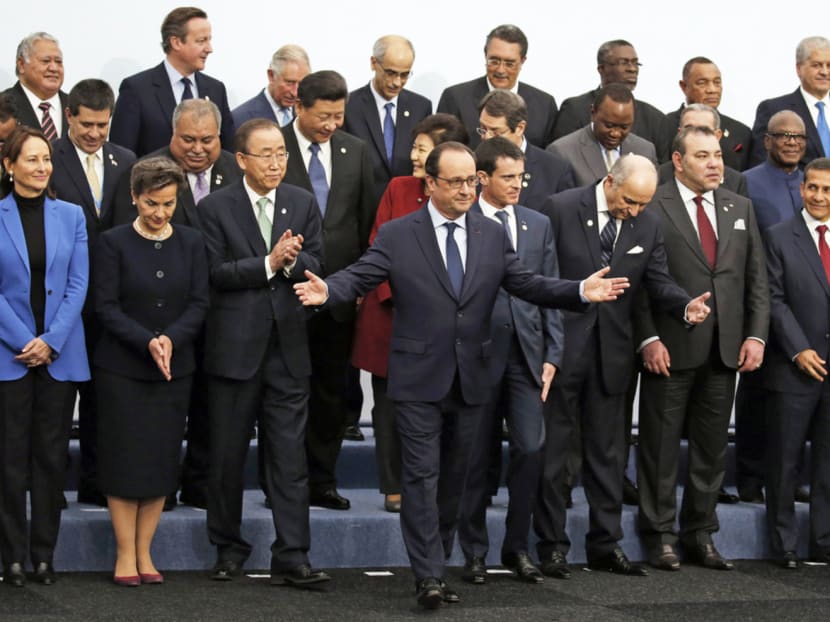Rich-poor divide likely to again prove an obstacle to climate pact
PARIS — As world leaders and officials gather in Paris to try to forge an accord that could begin to avert the most devastating effects of global warming and redefine the economy of the 21st century, one of the biggest fights will be over the responsibility of developed and developing countries in dealing with climate change.

French President Francois Hollande (centre) posing with world leaders for a photo at the COP21, United Nations Climate Change Conference in Le Bourget, outside Paris, yesterday. Photo: AP
PARIS — As world leaders and officials gather in Paris to try to forge an accord that could begin to avert the most devastating effects of global warming and redefine the economy of the 21st century, one of the biggest fights will be over the responsibility of developed and developing countries in dealing with climate change.
The United Nations has hosted annual summits to tackle the issue since 1995, but all previous efforts have foundered, primarily due to deep divisions between rich and poor nations.
In a sign of how contentious the issue will be, both Indian Prime Minister Narendra Modi and Chinese President Xi Jinping yesterday issued blunt warnings that rich nations still have a moral imperative to lead the fight against global warming.
Writing in the Financial Times, Mr Modi said advanced countries that “powered their way to prosperity on fossil fuel” must continue to shoulder the greatest burden. “Anything else would be morally wrong,” he says.
Mr Xi told world leaders at the climate summit in Paris that developed countries should accept “more shared responsibilities” for limiting global warming and helping poor countries adapt to a climate-afflicted world. “Developed countries should honour their commitment of mobilising US$100 billion (S$141 billion) each year from 2020 and provide stronger financial support to developing countries afterwards,” Mr Xi said, according to an official translation of his remarks.
Rich nations pledged at a United Nations summit in Copenhagen in 2009 to muster US$100 billion annually in financial support to poor countries starting in 2020. The money is meant to help them cut greenhouse-gas emissions that drive global warming, as well as to adapt to rising sea levels, droughts and other potentially catastrophic impacts. However, six years later poor nations are frustrated that rich countries are yet to fully commit to the fund.
Many wealthy countries insist there can be no deal in Paris unless large emerging economies take on more responsibility for fighting climate change.
The previous climate treaty, the 1997 Kyoto Protocol, divided the world into developed and developing countries and only required the former to cut their greenhouse gas emissions. The United States, the European Union and other developed countries said this time all countries must chip in, and that the rich-poor firewall is outdated anyway since it classifies countries such as Qatar, the wealthiest country on Earth per capita, as developing.
Even though almost all countries are in practice moving into a new era by presenting their own emissions pledges, India and many others want the Paris agreement to state clearly that the developed countries have a bigger responsibility to fight global warming.
Writing in the Financial Times, Mr Modi said: “Justice demands that, with what little carbon we can still safely burn, developing countries are allowed to grow. The lifestyles of a few must not crowd out opportunities for the many still on the first steps of the development ladder.”
Wealthy countries say the growth of big emerging economies such as China and India means the threat of global warming cannot be addressed solely by the pool of older industrialised countries that account for a dwindling share of global emissions.
Beijing has signalled a willingness to shift, agreeing to deliver some US$3 billion in funding to help poorer countries combat climate change and setting a date of 2030 for when its emissions will peak.
But India, which relies heavily on coal and is home to millions of the world’s poorest people, has been more reluctant to take such steps. That makes New Delhi central to the outcome of the Paris talks, where a deal must be agreed by consensus. AGENCIES






